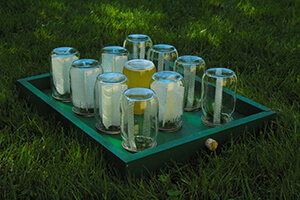
Some things should never be calculated. I learned this basic lesson many years ago from a skating coach. After I won my first gold medal — okay, it was some kind of yellow metal medal — I tried to tally the money I spent on skates, lessons, rink fees, travel, competitions, practice clothes, sequined costumes, motels, and meals out. The amount was staggering. When I mentioned this to my coach, he said, “Never add it together. It ruins the joy.”
You could view his advice as self-serving; after all, I was a substantial part of his meal ticket. But emotionally, he was absolutely correct. Why ruin a good thing by fulminating over the cost?
Years later, however, I reassessed those expenses. At the time I was skating, I didn’t give much thought to the opportunity costs of spending so many hours at the rink, hours spent waking at 4 a.m. six days a week to get sufficient practice time, tracing thousands of repetitious figures, and crashing on my bum till it was purple. I failed to include the cost of the double compound fracture of my leg that put me in the hospital twice, the titanium rod that I still carry around inside, and the rehab that was both painful and boring.
But even so, skating was one of the best parts of my life. I glided to music for years, and the tunes I skated to back then still fill me with adrenaline and nostalgia. It was pricey, forced me to survive on peanut butter and jelly, and set me back career-wise. But would I do it all again? No question.
A convenient home money pit
Backyard beekeeping is not much different. Just like skating, the beginning costs are manageable, but as your interest escalates, so do your costs.
You soon realize the beginner kit you were so excited about doesn’t begin to cover your needs, so you acquire one more thing and then another. It doesn’t take long before you’re spending hundreds, if not thousands, more than you anticipated. And the new pickup you need to haul it all around? We’ll get to that in a moment.
Starting with the basics
So what do the basics cost now in 2021? Well, I just happen to have a stack of new catalogs piled on my desk, so let’s make a list.
Beekeepers argue about everything, so what a beginner needs is a point of contention. Anyway, I had to start somewhere, so here’s a list based on a typical beginner’s kit:
- 2 ten-frame brood boxes, including frames and plastic foundation
- 2 ten-frame medium supers, including frames and plastic foundation
- outer telescoping cover
- inner cover
- bottom board, including entrance reducer
- queen excluder
- bee brush
- bee suit
- gloves
- hive tool
- smoker
- beginner’s book
According to the catalogs, that abbreviated list will cost you plus-or-minus $550, depending on the quality of items such as the bee suit, the smoker, and gloves. Of course, the beginner’s kit doesn’t include the bees.
These days, a package is around $200, depending on shipping. A nuc, which is often a better choice for a beginner, will run around the same amount, but you will need to go get it. With any luck, your pick-up point will be within 500 miles — or maybe not. If you’re not so fortunate, you may need to spring for a night’s lodging and meals.
However, if you actually read the bee book, it will most likely advise you to start with at least two hives and two colonies, so you can double the cost of the woodenware and the bees. If you decide to take the two-hive advice, you’re well into four digits on your first day of beekeeping.
Never enough equipment
The problem is you still don’t have enough equipment. On day one, you’ll need some kind of feeder for each hive and something to put in the feeder. You will probably need to treat your bees for mites soon after they arrive — or at least be ready to, just in case. These days everyone seems to be fond of oxalic acid vapor, which requires oxalic acid ($45), at least a half-face respirator with cartridges ($60-90), a vaporizer (ranging from $130 to $500, give-or-take), and usually a 12-volt battery or portable generator ($?).
Yes, alternatives exist. You can buy many types of mite treatment, each coming with a list of pros and cons. But in any case, you should be counting your mite load, an activity that may require a sticky board or some type of test kit. You will probably spend more money per year on mites than bees, so don’t overlook extermination during your financial reckoning.
Overlooked necessities
The original deal I brokered with my husband, Rich, was that he didn’t need to do anything with bees — they were strictly my thing. But I soon realized that I couldn’t lift full boxes, and I needed serious help.
So added to my expense list was a bee suit for him, and gloves, a veil, a helmet, and an EpiPen. The EpiPen required a doctor visit and a prescription — all expenses I hadn’t seen coming. Later, when I kept an outyard at a friend’s place, I had to provide protective wear for him too, so he could mow his lawn without fear.
Hive stands and rock walls
Often, it’s not the beekeeping equipment itself that’s so expensive, but the related projects. After Rich built my first permanent hive stand, concreted into the ground, we realized it needed a roof. Where we live, rain happens for nine months on end, so we retrofitted a roof that keeps out most of the rain and retards some kinds of mold.
After the second hive stand was built — this time with a preconceived roof — the ground behind it began sloughing away. After half a season, I could no longer stand behind the hives to work, but had to stand beside or in front. We finally decided we needed a rock retaining wall.
We purchased a bunch of individually selected one-man rocks, each of which took two men to move. Since everything here is on a hillside — except the swampy part that’s under black muck the consistency of whipped potatoes — we hauled each one individually along the root-encrusted path in a hand truck, which just about killed both of us.
The rock wall did the job, and now that green mossy stuff has grown all over it, it looks cool, like something the ancient Romans may have built using legions of stonemasons with expendable lives and tree-trunk rollers.
I don’t recall how much we spent on stones and supplies, just that they don’t give that stuff away. The work, though, I do remember, and the time spent doing it was massive.
Bees extract money
If you make it in beekeeping long enough to get a honey crop, you may start thinking about an extractor. Now there’s a subject with dollar bills attached. One of the problems with extractors is that ….


